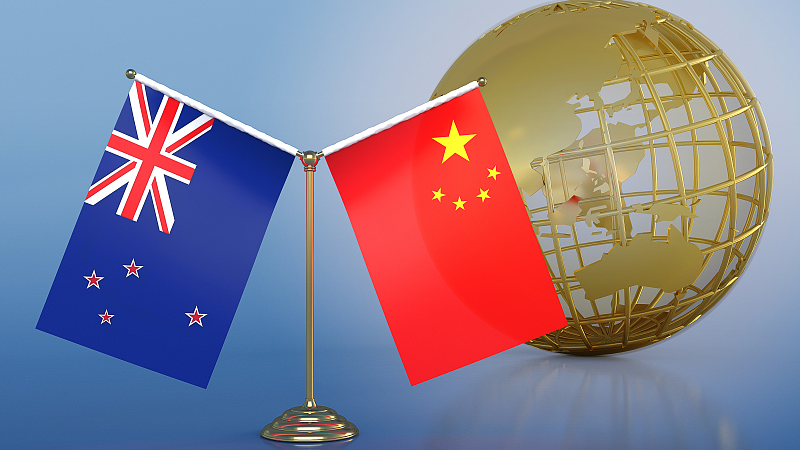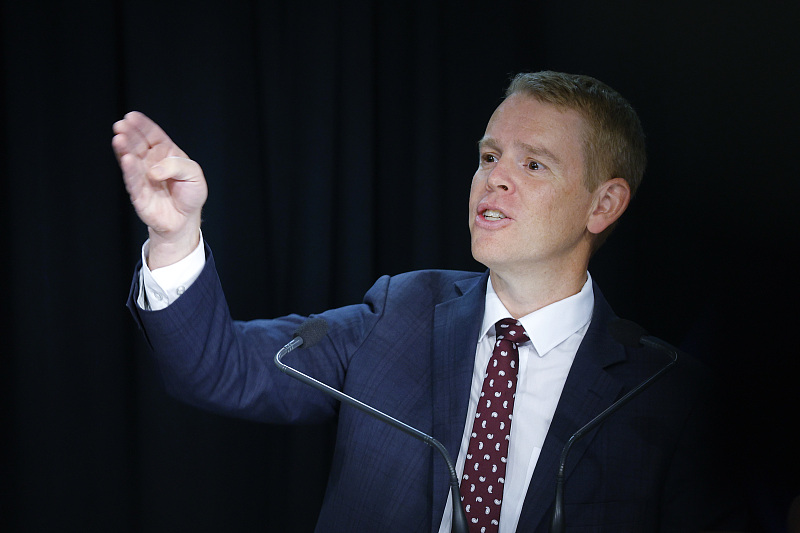
National flags of New Zealand and China. /CFP
National flags of New Zealand and China. /CFP
Editor's note: Azhar Azam, a special commentator on current affairs for CGTN, works in a private organization as a market and business analyst and writes about geopolitical issues and regional conflicts. The article reflects the author's opinions and not necessarily those of CGTN.
New Zealand's Prime Minister Chris Hipkins will pay an official visit to China at the invitation of Chinese Premier Li Qiang from June 25 to June 30. During his maiden five-day trip to the world's second-largest economy, since he took office, Hipkins will be accompanied by a large trade delegation comprising representatives from some of the country's biggest companies.
New Zealand's largest diplomatic footprint in the world is in China and the two countries are comprehensive strategic partners, both of which underline China's importance for New Zealand as a trading and strategic partner.
China is a key export market for New Zealand's dairy, meat, wood, and other products. Wellington seeks to seize the "significant opportunities" offered by China's sizable and growing middle class.
Although the two countries maintain divergent approaches to their respective social systems and development, they can successfully manage differences. Both are members of the Regional Comprehensive Economic Partnership (RECP) and have upgraded the China-New Zealand FTA to align it with the latest trade policies, address new issues like e-commerce and put greater emphasis on environmental challenges. These agreements will accelerate unimpeded trade and inject new vitality into the relationship.
The extensive commonalities in their policies such as support for multilateralism, open world economy trade, global peace and development, the United Nations-driven international order, and tackling climate change through international cooperation will cement the partnership, help to forge ahead jointly in a world of rising protectionism, ensure regional stability and diversify trade in other areas.

New Zealand Prime Minister Chris Hipkins speaks during a post cabinet press conference at Parliament, Wellington, New Zealand, January 31, 2023. /CFP
New Zealand Prime Minister Chris Hipkins speaks during a post cabinet press conference at Parliament, Wellington, New Zealand, January 31, 2023. /CFP
Hipkins believes China makes up a "critical part" of New Zealand's economic recovery. According to his office, he will meet with China's high-level leadership. This as well as business-to-business meetings and promotion of New Zealand products in Beijing, Shanghai, and Tianjin will offer him the opportunity to introduce and gain support for his ambitious trade diversification plan.
Attracting Chinese tourists also ranks high on Hipkins' priority list as China, before the pandemic, was the second largest source of tourists and a major source of international students.
Although New Zealand is part of the so-called U.S.-led Five-Eyes intelligence sharing arrangement – another small anti-China clique – it follows an independent foreign policy. Former Prime Minister Jacinda Ardern was characterized as "West's woke weak link" just because she refused to sign the alliance's controversial joint statements criticizing Beijing and prioritized her country's economic interests with its biggest trading partner. The country's Foreign Minister Nanaia Mahuta once famously warned "We are uncomfortable with expanding the remit of the Five Eyes."
China is accused of wielding "influence" in New Zealand; Mahuta during her trip to Beijing this March rejected the notion and hailed Beijing's positive influence as a major country and the comprehensive strategic partnership to expand the scope of cooperation from economy and trade to cultural and people-to-people exchanges and peace and security in the Asia-Pacific, appreciating China's leadership in climate change, biodiversity, and sustainable development. Noting the significance of New Zealand's relations with China, she more recently warned of making binary choices like during the Cold War and pursuing "a fixed predetermined view."
Hipkins confronted U.S. President Joe Biden's view about China by saying Beijing has its governance system and this is a "matter for the Chinese people." This sends a positive signal and could set the tone for a constructive dialogue. It is crucial to be wary of engagement with NATO for its historical provocative and anti-peace policies and diversify the deepening and multifaceted China-New Zealand relationship amidst attempts to destabilize and hegemonize the region by creating a hype of the "China threat."
A consensus to further boost trade, economic, and science and technology relationships, will add new areas of cooperation to the China-New Zealand partnership and safeguard regional peace. It would strengthen joint efforts to focus on real-world challenges such as climate change and free trade as well as regional security.
(If you want to contribute and have specific expertise, please contact us at opinions@cgtn.com. Follow @thouse_opinions on Twitter to discover the latest commentaries in the CGTN Opinion Section.)